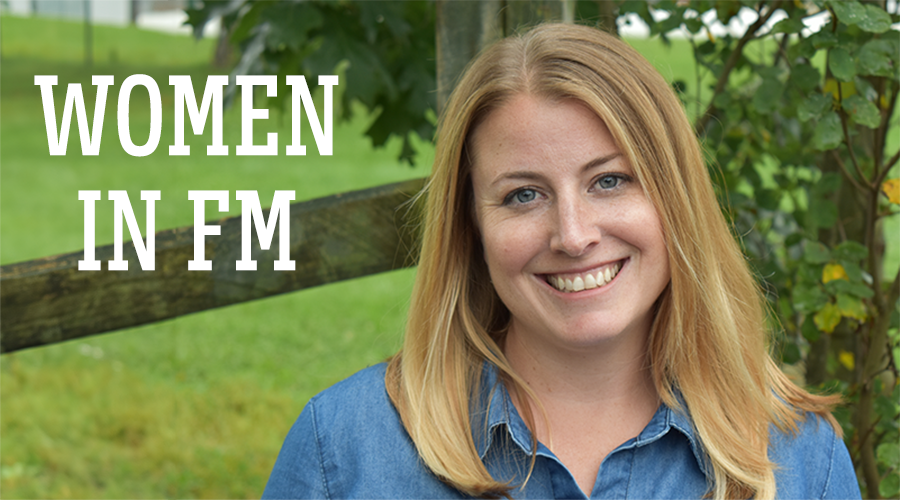“I kind of fell into facilities,” Kristin Podwojski, director of operations for the Children’s Charity of the Delaware Valley says. “My dad was a general contractor, so I kind of grew up learning a lot of things through home maintenance by just watching his lead on things.”
Little did Podwojski know that when she was watching her father, she was actually preparing for her future career.
“I have worn a lot of different hats and as true in nonprofit, you learn to adjust and jump in,” Podwojski says. “Every day is a school day in a sense that I learn something different.”
According to its website, The Children’s Charity of Delaware Valley in Worcester, Pennsylvania, enriches “the lives of children and young adults with disabilities through social, educational and vocation programs that nurture independence and self-confidence, and prepare them for life.” On just 77 acres of land, the camp houses more than 30 buildings. Podwojski and her team work hard every day to ensure that the camp remains resilient and accessible to attendees.
“Everything on our campus – infrastructure, buildings – were all built in the 1950s with the exception of one building,” Podwojski says. “So, we are facing a lot of clean up needed and maintenance constantly on these buildings, which can be a little bit of a struggle as a nonprofit. Funding isn’t always there, so a lot of it [maintenance] is based on priority.”
Podwojski explains that early intervention is an essential part of her role. For example, if there was a flickering light or a corner of a room with peeling paint, she would priorities to fix the light as it could have a detrimental effect on campers that have light sensitivity. She credits being able to make these choices by simply being empathetic. She says that putting herself in the shoes of a parent with a child with a disability allows her to better prioritize maintenance needs, even if it doesn’t always make someone else happy.
“Quite frankly, it comes down to where does the priority lie,” Podwojski says. “You have to always go back to what’s the biggest impact for our clients. Visually, we want our camp to look appealing, but it doesn’t matter if our kids aren’t getting served the way they deserve to be.”
Prioritizing people
As anyone with a career in facilities knows, there will come a time when you have to fight for what can get done. Having a limited budget and small staff, Podwojski relies on volunteers and her own creativity to be able to complete tasks and keep the camp accessible for all attendees. What makes Podwojski so special, though, is how she openly cares for every single person who attends the camp. She prioritizes their needs and continuously advocates for them to have a better space. The amount of heart she put into her position helped earn her a spot as a 2022 Facility Champion.
“I have to fight a little bit every day,” Podwojski says. “Time only exists as much as it does. Sometimes what you’re pushing doesn’t make people happy – and it’s a struggle every single day. I can’t speak for the for-profit world because I work in a nonprofit, but I can say that in nonprofit we are very much understaffed, and that’s just the nature of it. As much as you hate that, you quickly learn to adapt and work with what you’re given.”
Being understaffed doesn’t mean that Podwojski isn’t detail oriented. She credits this skillset to knowing the layout of the camp’s campus and how it serves to interact with the campers. Podwojski and her team also have to limit their interactions with outside contractors because of budget constraints, making it so that they must do a lot of maintenance in house.
“When it comes to this facility and the upkeep and maintenance to it, I know what I’m talking about,” Podwojski says.
Building a community
Unlike a lot of other women in facilities management, Podwojski finds herself in a unique position where her CEO and board of directors are both women. Being in a female-dominated organization has given her the right to be respected from the get-go and not feel like it was something that had to be earned. She often brings her teenage daughter with her to work and hopes that she sees the way that she gets treated by her coworkers, both male and female, and how that respect should be placed at every organization.
“I think of my daughter and I hope it makes her stronger as she grows,” Podwojski says. “She’s a teenager now and she gets to see me interact with my team and my colleagues. I hope that just helps build her up and she’s able to have that confidence as she gets older.”
That’s why building a community of female facilities workers is crucial to the industry. Women are more likely to join the industry once they see other women thriving in it because it makes the job not only seem more glamorous, but also attainable.





